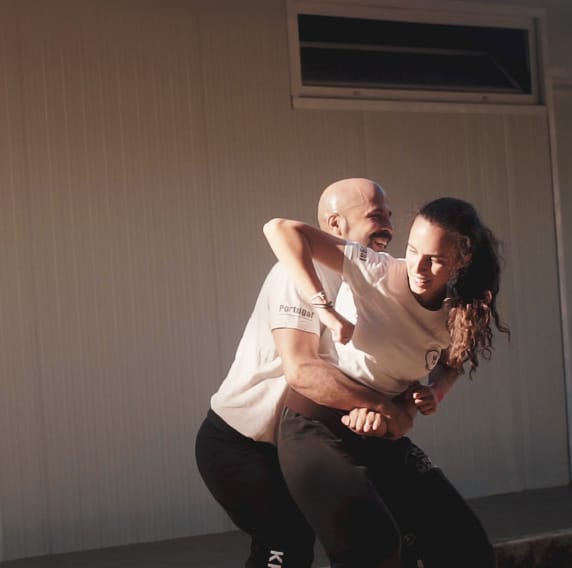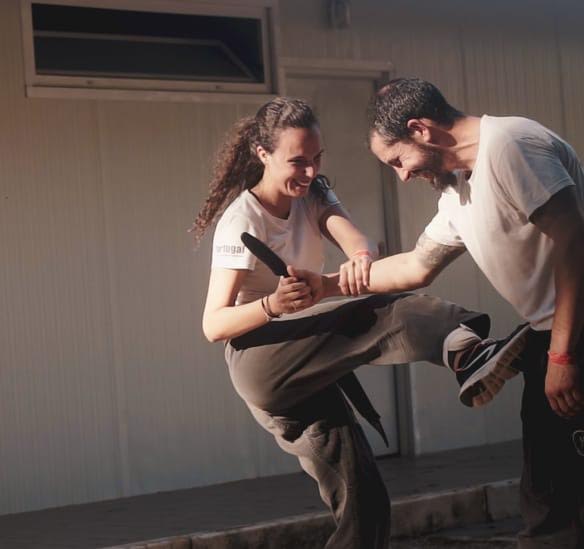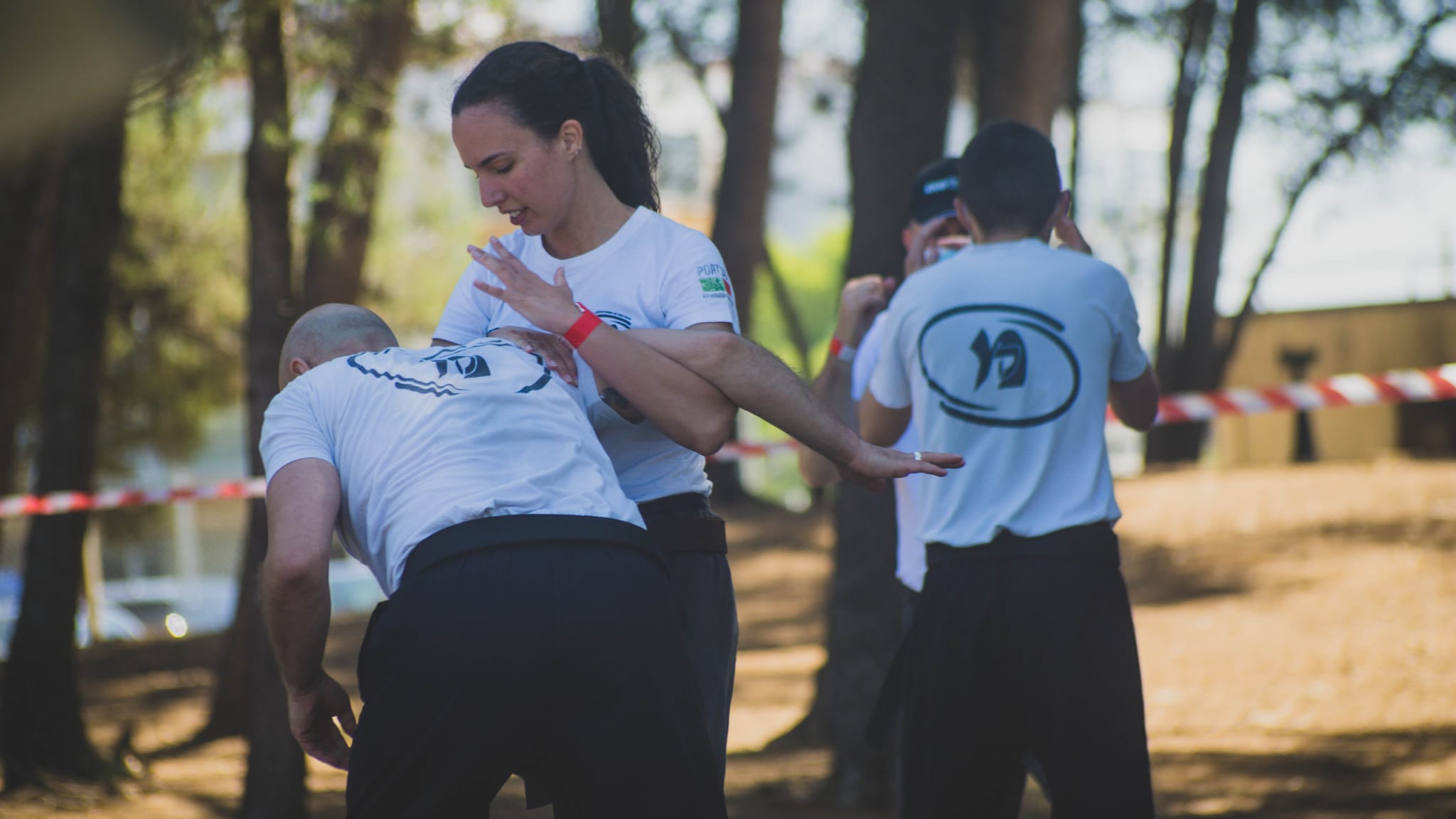I was curious about the posture and the body language of this young Portuguese woman. I thought, “Finally a woman who would shake your hand and do it properly.” Shaking hands is how we mainly greet each other in Egypt, so every time I met her, I felt briefly like I was back home. However, the point wasn’t that Rita shook hands like a tough Alexandrian woman would, but that she had this long, beautiful hair and tended to blush often, yet managed to reach an advanced level in a male-dominated sport such as Krav Maga.
It is easy to recognize that she is the only woman among her training partners who have brown or black belts. She often pairs up with one or two or three men at a time, throwing one to the floor, receiving a kick from the other while defending a punch from another.
This is tough stuff. Krav Maga is a tough fighting discipline combining aikido, judo, karate, boxing, and wrestling, designed by soldiers to quickly neutralize threats in real-world situations.
I asked myself: How does a woman in Lisbon fit in so well in a male-dominated sport and make herself be taken so seriously?
Rita Ramalho started Krav Maga when she was 15 years old. She became an instructor at the age of 18! She found out about Krav by complete coincidence. As she was dropping off her sister at a dance class, she realized that the same school offered Krav Maga classes. She had already heard of this marital art before and decided to give it a shot.

How did you become an instructor?
Three years into doing Krav Maga, I began to stand out technically. Usually in Krav Maga you can become an instructor when you get to green belt. My first instructor encouraged me to teach Krav Maga and was supportive of this step. I started training five times a week instead of three. I also attended the instructors’ course provided by the Portuguese Federation of Krav Maga and became an instructor.
I used to teach Krav Maga at my own school. Later on, Rui Alves, one of the very experienced black belt instructors in Portugal, invited me to co-teach with him at ESMAVC. I joined him in October 2021. It has always been easy with Rui as he encourages a family-like atmosphere in class and creates a very welcoming environment for women.
What were the main challenges you went through as a young woman in a sport in which the majority are men, usually older than you?

The main challenge was that I really had to excel technically to compensate for the fact that my male counterparts are physically stronger. Therefore, what was lacking in physical strength had to be made up for with very good command of the technique. I found myself being questioned and explaining technique to my peers which was another motivation for me to become an instructor.
The second challenge was to be taken as seriously as my older male colleagues, and so I really drew a line between my private life and the professional. Sometimes, in training, I would ask a partner to grab or attack me the same way he would with a male colleague.
I would say: “I am a woman, but I am a brown belt, I don’t want to be treated differently because of my gender”.
And what about challenges for women in general? I imagine that it could be intimidating for some women to pair up with men in class, so you might end up with a cluster of men and another of women. Is that something you noticed?
Yes, I noticed that women tend to stick together and men do the same. As an instructor, I try to maintain a certain gender balance, getting female students, who feel intimidated, out of their comfort zone by pairing them up with trustworthy male students.
Students usually have their own dynamic, they pair up amongst themselves in a natural way. They have to feel comfortable, of course, but it also important for us as instructors to ask ourselves: Why do different people come to learn Krav Maga?
Women usually join because they want to feel more safe leaving work at a late hour, that they can defend themselves from what would commonly be a threat from a stronger man. Therefore, we need to keep that in mind as we teach them.
Another challenge is that women tend to quit at some point, for example when they start a family. It becomes hard to keep coming to training. I believe that is one of the reasons why there are more men at advanced levels than women. It would be interesting to do a study on why people join a Krav Maga school in the first place and why some people quit while others don’t. Only then can we discover more about why it is more challenging for women to continue in Krav than men.

How do people outside the context of Krav Maga receive you being a woman who does and teaches this sport?
People are usually surprised, when they look at me that’s not what they see. I used not to tell people that I was doing Krav Maga. It was my secret weapon, something that kept me safe and confident.
I also thought that I might be treated differently for being a woman at an advanced level in Krav Maga. However, now it is different for me, I’ve learned to embrace the vulnerability and I don’t mind sharing it anymore.
––––––––––
When we met at a café for the interview, both Rita and I said how we don’t like to sit with our back to the door – that we both feel more comfortable sitting facing the door which wouldn’t have worked where we were. At that point, I thought of how women’s experience of everyday life is shaped by many invisible, seemingly trivial struggles along with the bigger, more common issues.
However, it is these types of challenges – big and small, invisible and outright in-your-face – which contribute to a story worth telling.
Such as Rita’s.
Read more from Sarah here in Dispatches’ archives.
Sarah Nagaty has a PhD in cultural studies, She’s lived in Portugal for six years.
As a student of cultural studies, Sarah is drawn to what connects people from different backgrounds to new cultures and places, how they relate to their new surroundings and what kind of activities they could engage with in their new hometowns.















